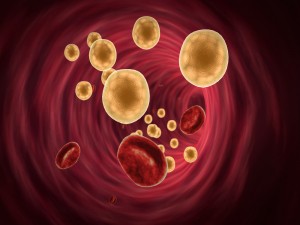Johns Hopkins Researchers Test New Therapy for High Cholesterol
 It has become all-too-common for people with high cholesterol to take statin medication to help manage these levels. Unfortunately, there are many patients who have not responded to this form of treatment. New research shows that a less intense type of statin combined with a different medication may be better in these circumstances.
It has become all-too-common for people with high cholesterol to take statin medication to help manage these levels. Unfortunately, there are many patients who have not responded to this form of treatment. New research shows that a less intense type of statin combined with a different medication may be better in these circumstances.
(Quick Fact: February is considered to be American Heart Month.)
People with high levels of low-density lipoproteins (also known as “bad” cholesterol) are at a greater risk for heart disease. Many patients are prescribed moderate or high-intensity statins to help lower their LDL cholesterol levels. Unfortunately, there are many who react negatively to this form of therapy.
Recent high cholesterol clinical trials have shown that a lower-intensity statin combined with another form of cholesterol medication– specifically ezetimibe or bile acid sequestrants may be the solution.
New Research from Johns Hopkins University
A team of researchers at Johns Hopkins University led by Dr. Kimberly Gudzune reviewed a total of 36 published studies on patients that were administered statins on their own or statins in combination with these other medications.
Doctors often choose to prescribe statins if their patients are not able to lower their cholesterol through:
- Exercise
- Diet
- Weight management
- Nutritional supplements
(Fast Fact: The National Cholesterol Education Program considers LDL levels at or above 4.91 mmol/L (millimoles per liter) to be very high.)
Statins tend to be well-tolerated overall but they can produce a number of adverse side effects. Some patients have reported all of the following after taking statins:
- Muscle pain and damage (myopathy)
- Digestive issues
- Liver damage
- Rash
- Increased blood glucose or even type 2 diabetes
- Some cases of memory loss or confusion
Dr. Gudzune and her team weighed the benefits and risks of administering a lower-intensity statin combined with these other types of treatment that can modify lipids. These other medications include:
- Ezetimibe
- Fibrates
- Niacin
- Bile acid sequestrants
- W-3 fatty acid
The team discovered that low-intensity statins when combined with ezetimibe or bile acid sequestrants lowered LDL cholesterol levels as well as higher-intensity monotherapy in patients at risk for heart disease. So far, the team has not compiled much data on reported adverse effects of this new treatment approach.
Does this Approach to High Cholesterol Treatment Work Better?
The most important results of the study were as follows:
- A low-intensity statin plus bile acid sequestrant reduced LDL levels by 0 to 14 percent more than mid-intensity statins in patients with abnormally high cholesterol levels.
- A mid-intensity statin given with ezetimibe reduced LDL cholesterol 5 to 15 percent more than high-intensity statins in patients with atherosclerotic cardiovascular disease.
- A mid-intensity statin given with ezetimibe also reduced LDL levels by 3 to 21 percent more in patients with diabetes.
- This high cholesterol clinical trial did not produce enough evidence to compare monotherapy to combo therapy with fibrates, niacin and w-3 fatty acid.
“Patients with LDL levels greater than 4.91 mmol/L are at great risk of cardiovascular disease and should have a discussion with their physician about how to decrease their disease risk. High dose statin monotherapy has demonstrated benefits with regards to lowering this risk, so this strategy should always be considered first,” explained Dr. Gudzune.
“However, for patients who cannot tolerate high doses of these medications or do not respond to these medications, patients and physicians should weigh the LDL benefits by using combination therapy with lower intensity statin and bile acid sequestrant or ezetimibe.”